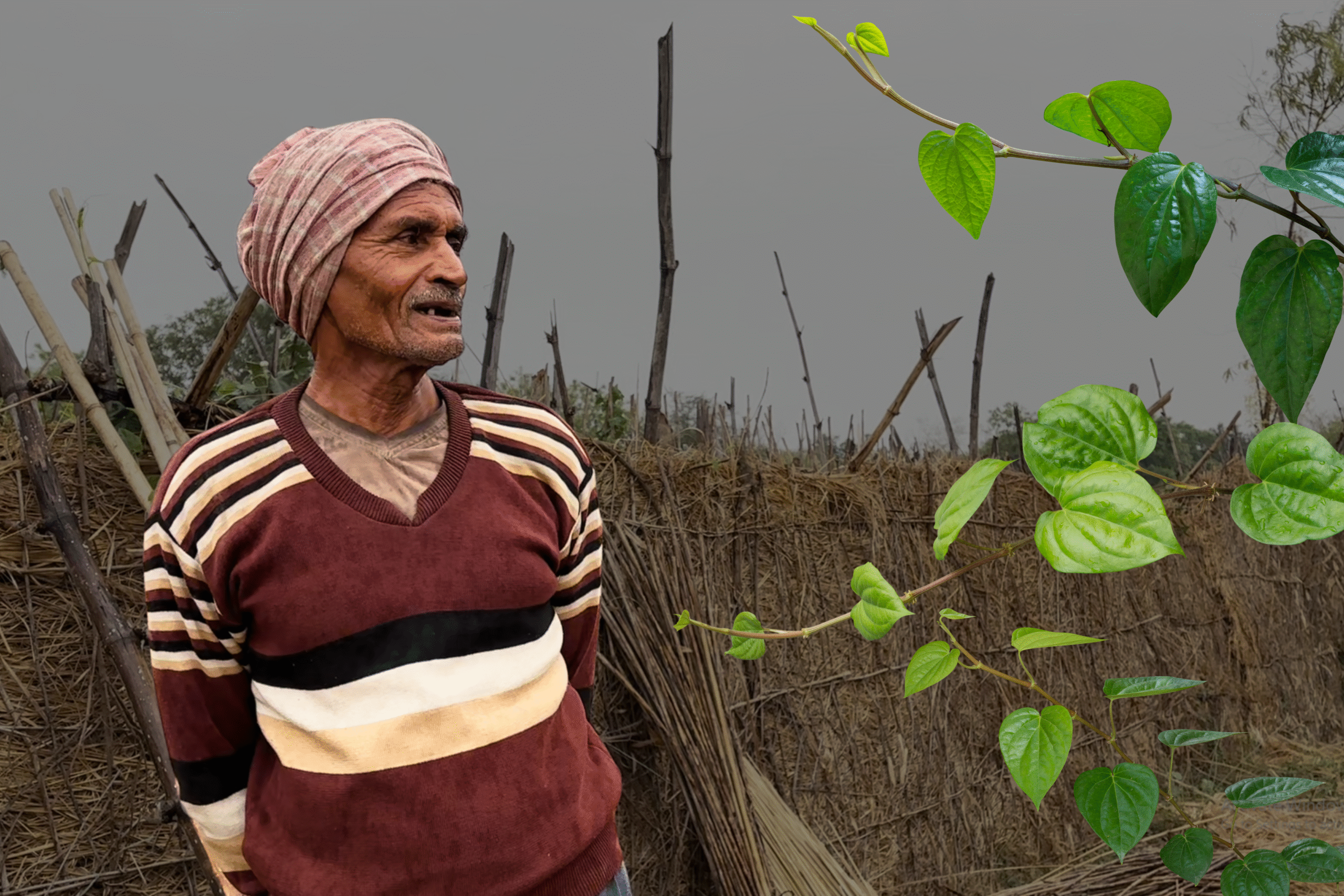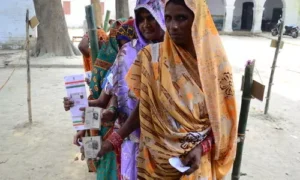Patna, Bihar
Little did Aamir Subhani, an IAS officer, expect that his bank account would be hacked into. Two months ago, on October 23, the chief secretary of Bihar received a message on his mobile phone informing him that there had been a transaction of Rs 40,000 from his account. Subhani had received no OTP prior to the transaction; just the message that the money was withdrawn.
In a media statement two days later, the state cyber cell confirmed that the chief secretary’s account was in an Indian multinational public sector bank. The cyber criminals had made online purchases from two big companies through a famous online shopping platform.
Ravi Kumar of Patna, the state capital, suffered a similar fate. “In February this year, I received a call on my mobile from my bank’s credit card division. I was told that I had not paid my premium of Rs 3,000, and I was asked for my credit card number, and the OTP,” he recalled.
Though he did not share the OTP, Kumar claimed shopping worth Rs 99,000 was done from his account. “I rushed to the bank and was told that the money would be reversed in 15 days. I got back Rs 33,000 after which I have not got another penny,” Ravi Kumar told Gaon Connection.
Also Read: Online gaming and gambling — a debt-and-death trap for rural youth

Aamir Subhani, the bureaucrat from Bihar who was duped in a cyber fraud.
Internet has penetrated deep into the Indian hinterland. Of the 646 million active internet users in the country aged two years and above, 352 million are in its villages. Rural India has a 20 per cent higher presence of internet users than its urban counterpart, as documented in a recent study titled Bharat 2.0 Internet Study. It was released by Nielsen, a global leader in audience measurement, data and analytics.
The study, released in May 2022, revealed that female users’ growth in the last two years is a whopping 61 per cent per cent as compared to male users who grew at 24 per cent.
Led by growth in rural areas, the number of internet users in the country is estimated to hit 900 million by 2025.
With the growth of internet use in the rural areas, cyber crimes have reported a jump.
According to several media reports, many of those crimes are being tracked down to villages from where rural youth are being inducted into activities such as hacking into bank accounts, online financial frauds, creating fake social media posts, blackmailing individuals with morphed photographs and identities, etc.
Cyber criminals are making no distinction between the rich and the famous and the ordinary citizen.
According to the Indian government’s National Cyber Crime Reporting Portal, cybercrime may be defined as “Any unlawful act where a computer or communication device or computer network is used to commit or facilitate the commission of crime”. It includes Debit/Credit card fraud, phishing, child pornography, cyber bullying, cyber stalking, SIM swap scam, data breach, etc.
Also, more than 27 million Indian adults experienced identity theft between May, 2020 and May, 2021 and 52 per cent of Indian adults admitted they don’t know how to protect themselves from cybercrime, according to the ‘2021 Norton Cyber Safety Insights Report,’ by NortonLifeLock.
According to the National Crime Records Bureau’s (NCRB) report titled Crime In India 2021, released earlier this year, cyber crimes in India are increasing. In 2020, there were 136 cyber crime cases registered every day in the country. Last year, in 2021, India reported a total of 52,974 incidents of cyber crimes. This was a six per cent hike from the previous year (2020).
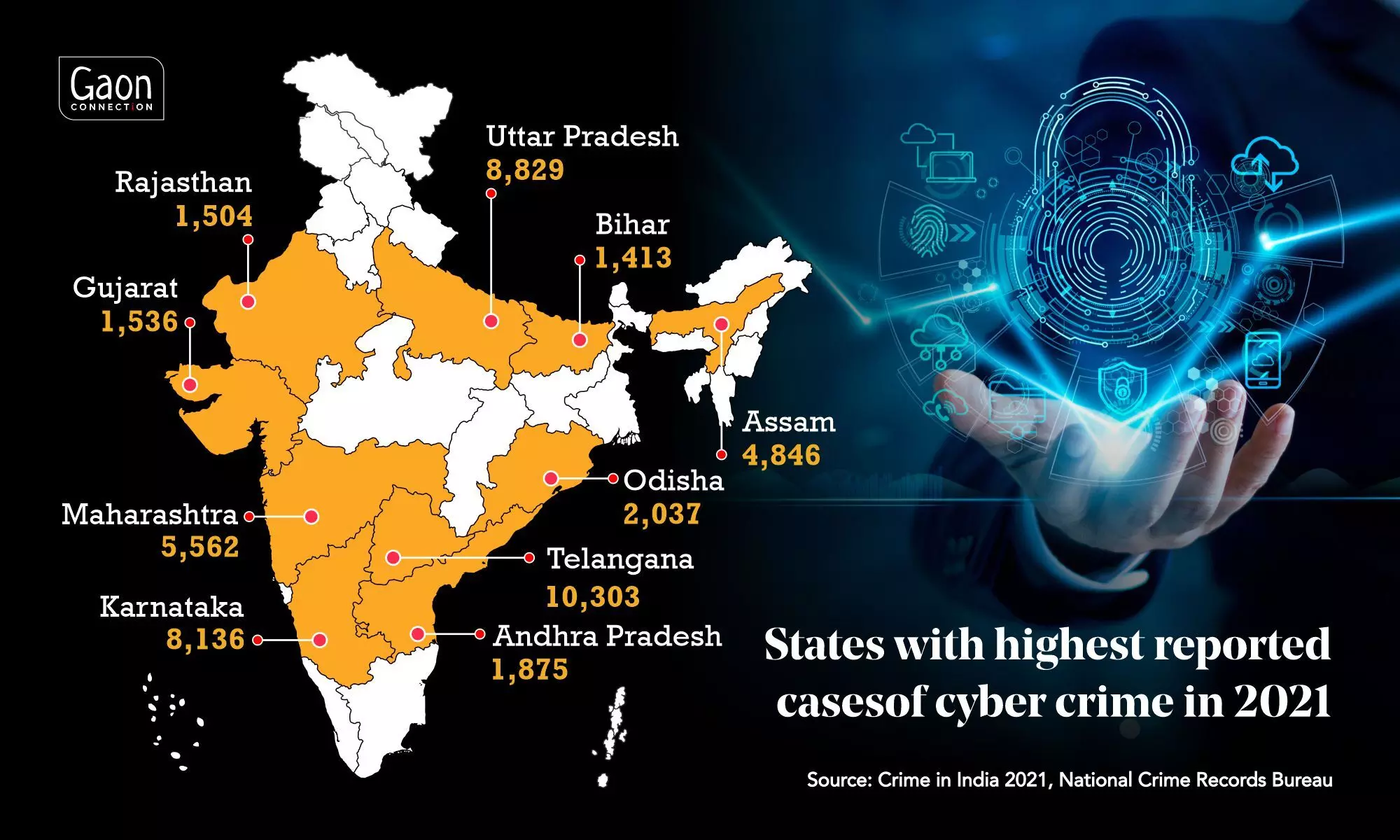
In an interview, KVM Prasad, Assistant Commissioner of Police (Cyber Crime), Hyderabad, said that most of the cyber crimes reported in Telangana were committed from states, such as West Bengal, Uttar Pradesh and Bihar.
In February this year, in Bihar Chief Minister Nitish Kumar’s home district Nalanda, 31 people were reportedly arrested in the district’s single biggest crackdown for cyber crimes. Eleven of them were women.
Nawada district of Bihar is often in news for cases related to cyber crime. For instance, as per news reports, on February 15 this year, the police apprehended 33 suspected cyber criminals all at one go. This happened at Thalpos village, which came to be called the Jamtara of Bihar (Jamtara In Jharkhand, is known to be the phishing capital of India).
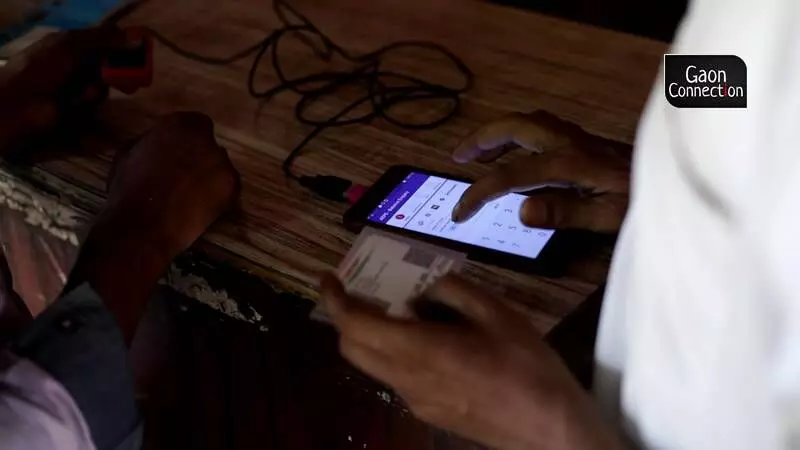
Cyber criminals are making no distinction between the rich and the famous and the ordinary citizen.
In October, once again, in Nawada, 11 suspects were arrested. Five of them were from New Delhi and six from Gospur village in Chakwai panchayat. “Many of those arrested are repeat offenders and have been arrested before for cybercrimes,” Ashish Kumar Mishra, Inspector, Pakribarawan thana, Nawada, who led the arrests, told Gaon Connection.
Also Read: Smartphone addiction leading to health disorders in rural India
“They had more than 22 lakh rupees in cash in their possession, 13 expensive mobile phones, one laptop, three bank passbooks, a cheque book, an ATM card, a sim card and some written matter related to cyber crimes,” the inspector said. The accused are still in jail, he added.
“Every month police from other states come here armed with telephone numbers that are tracked down to Bihar and are being used to conduct cyber frauds elsewhere,” the inspector said.
Ensnaring the rural youth
In May 2022, a team of police officials from Barotiwala in Himachal Pradesh travelled 1,300 kilometres to apprehended cyber-criminals in Bettiah district of Bihar, over cyber embezzlement to the tune of Rs 12 lakh.
“There was a lot of booing and pelting of stones when the police from Bettiah and Himachal Pradesh reached the area to arrest the suspects Shahid and Saif Ali,” Abhishek Gupta, a resident of Bettiah, told Gaon Connection. But that did not stop the police from apprehending the criminals who were running a lottery scam involving extortion of money.
During the course of the police investigation it came to light that many young people in the village were part of their gang, Gupta said.
One of those arrested in the raid was Santosh Kumar who hails from Akauni village in Jamui district.

“He was not interested in studying so we sent him away to work, but he returned within a year,” Neelam Singh, Santosh’s mother, told Gaon Connection. “His brother bought him a touchscreen mobile a few years ago. Had we known he would use it for such wrongdoing, we would never have given it to him,” the distraught lady said.
The families of some of the arrested are still in disbelief. Avdesh Patel from Katardih village in Nalanda district refused to believe his son, Sanjay, was guilty. “My whole family is involved in making bangles. Sanjay is our oldest boy and the police are trapping him in a false case,” he told Gaon Connection. “He worked hard for a living and with integrity. Ask anyone in the village if you want,” the father said.
According to a police official associated with the cyber cell in Patna, spreading awareness amongst the people is the best way to stem the rot. “The criminals keep changing the way they go about these crimes. Along with new technology, the younger generation adopt innovative ways of committing crimes,” he pointed out.
“They know how to make fake websites, create fake ids, hack into bank accounts. The masterminds employ these young people to do their dirty job and pay them a commission,” the police official said.

Female users’ growth in the last two years is a whopping 61 per cent per cent as compared to male users who grew at 24 per cent.
Meanwhile, a state-of-the-art cyber forensic lab/training centre has been set up in the state capital Patna at a cost of 28 crore rupees. And, every district has cyber cell units. According to the home department each district will also have a separate wing to crack down on cyber crimes, with a deputy superintendent of police in charge of it.
Law and police unable to tackle rising cyber crimes
In India, cybercrimes are covered under the Information Technology Act, 2000 (IT Act), and the Indian Penal Code. The IT Act, 2000, which came into force on October 17, 2000, deals with cybercrime and electronic commerce. The IT Act was later amended in the year 2008.
The Act defines cyber crimes and punishments. Amendments to the Indian Penal Code, 1860, The Reserve Bank of India Act were also done under this IT Act. The purpose of this Act is to safeguard e-governance, e-banking, and e-commerce transactions.
Click here to access National Cyber Crime Reporting Portal
Kunal Kashyap, an advocate practising at Patna High Court told Gaon Connection that the insufficient and under-equipped cyber cells in the state police are the primary reason behind the rising cyber crimes.
“Only the high profile cases or duped people who have the means to connect with the authorities are able to come to light. The common people in Bihar find it very hard to register their cases, leave alone getting justice,” Kashyap said.
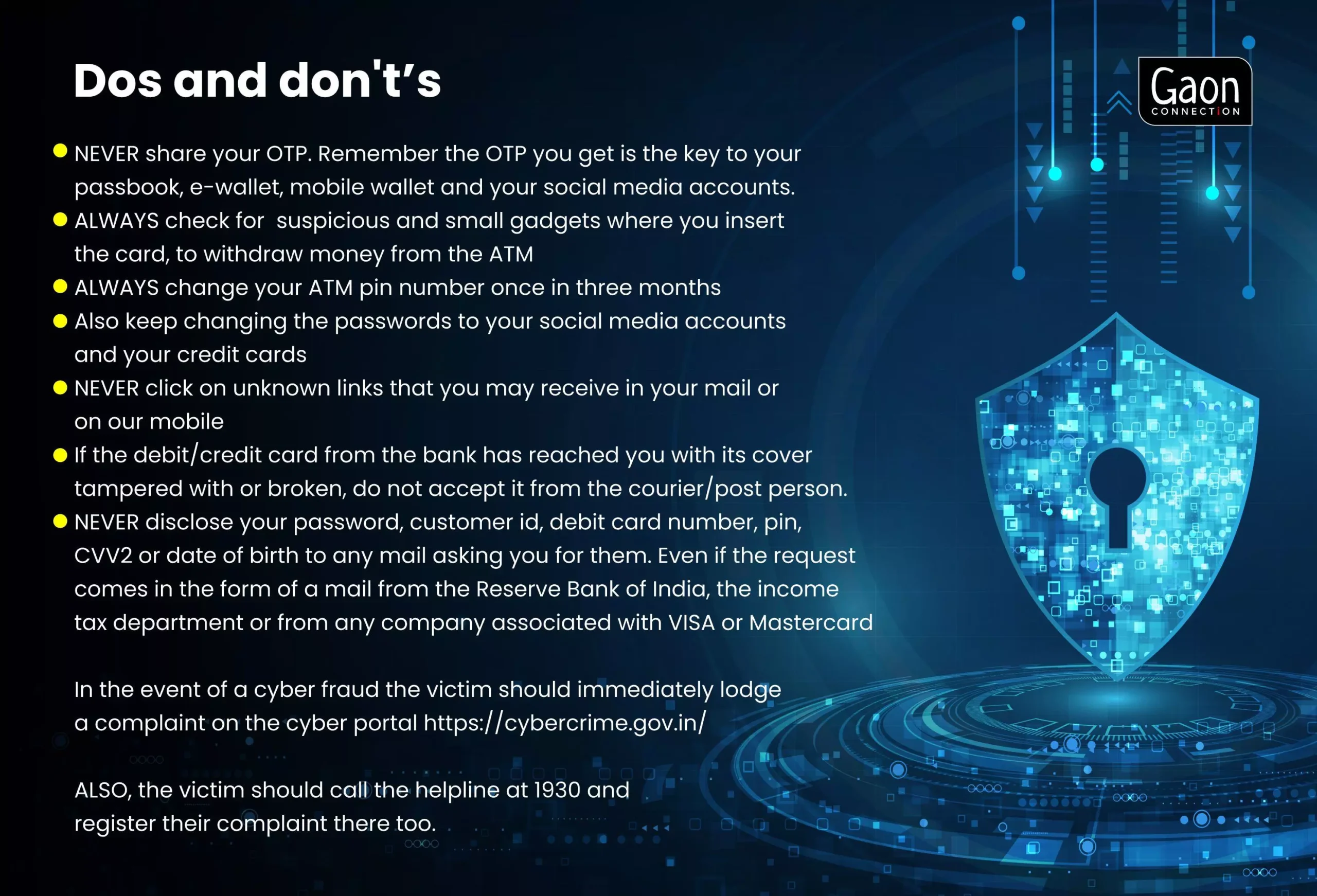
“These crimes are mainly of three types: the most common is the digital theft and involves stealing of confidential data such as credit card numbers and bank account numbers. The second method is by computer viruses which hack into the systems of the targeted user. The third one is through social media where customers share their financial details by getting lured to pornographic content,” he added.
Also Read: Mobile-addict kids: It’s a ticking time bomb
As per the lawyer, the banks are supposed to repay the amount transacted by unfair means but in such a case, it needs to be established in the court that the duped person is not at fault.
“Mostly it is seen that customers are unknowingly sharing the one time passwords or other personal information which makes it difficult for the lawyers to fight for their case,” he added.
Meanwhile, Deepak Kumar, a Delhi-based cyber expert who is regularly invited by the Bihar Police to train officers on issues pertaining to cyber security told Gaon Connection that the police administration is not equipped enough to handle such crimes.
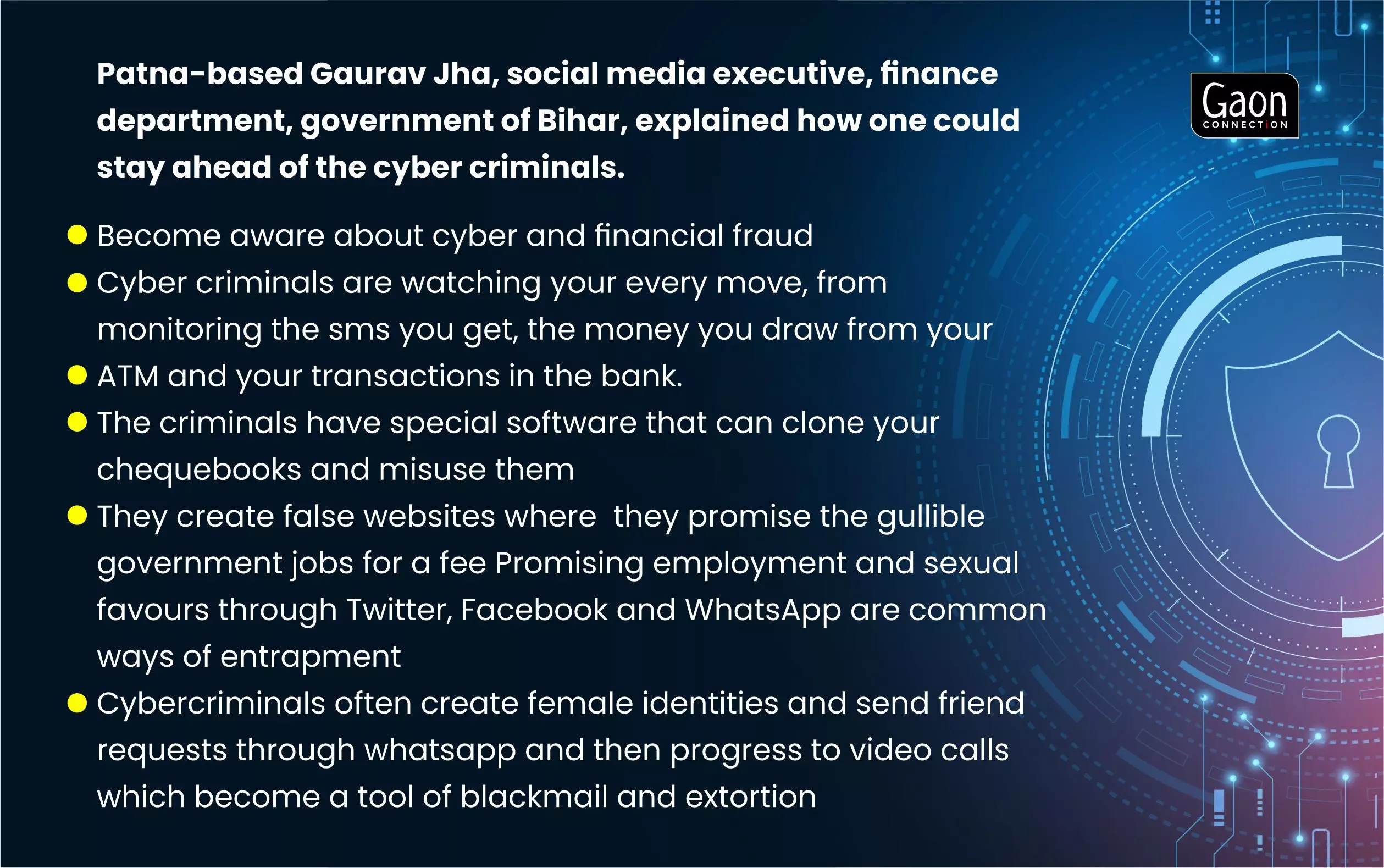
“On one hand, the government is pursuing digitalisation but the law enforcement is not in a position to nab cyber criminals. Most of the citizens keep personal banking information on their phones and most of the cyber crimes involve financial frauds,” Kumar said.
“There are many companies which are found to be questionable but their servers are not located in India. The government should bring legislation to act against such companies as well,” he added.
“Complaints about cyber crimes are also registered at regular police stations and many times police officials have no inkling about such crimes. Cases in which pornography is used to lure the victims are not even registered,” the cyber expert said.
Written by Pratyaksh Srivastava







